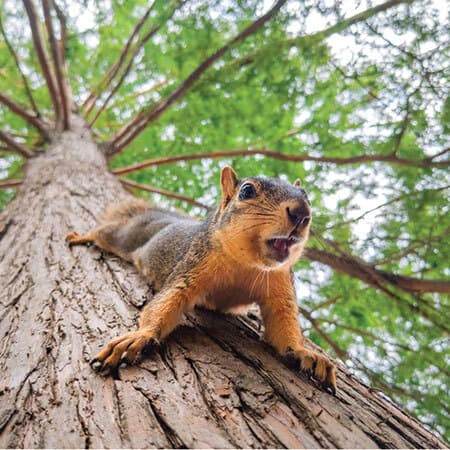Capital-area Chronicler Turns the Page
Departing Washington Post Columnist Shares 20 Years of Family Tales, Reader Favorites
By Karen Shih ’09
Portrait by John T. Consoli
Inset photos courtesy of John Kelly
After nearly 20 years, John Kelly ’84 won’t be following up on tip’s from loyal readers anymore.
The Washington Post columnist will have to continue his crusade against the incorrect use of apostrophes (such as the error we inserted above in his honor) and other tongue-in-cheek rants in a different medium. After publishing nearly 5,000 pieces of “John Kelly’s Washington,” he took a buyout to end an era as a local voice in the nation’s third-largest newspaper.
“I’m fortunate I can leave this job without knowing what I’ll do next—or if I’ll do anything other than watch Netflix,” he wrote in a December column announcing his departure.

He was an on-the-ground reporter covering mosquito research or public art projects or tackling readers’ queries about local history (including investigating 1970s UMD student streakers), and an amusing and introspective chronicler of his own family and nervous rescue dog, Archie (left).
Between pumping out 800 words of copy every Sunday through Thursday, he received hundreds of emails—and yes, some snail mail. “The photo editor I work with joked, ‘You just have the readers write for you!’” he laughs. “I’m lucky I have this platform to talk about myself, but also give others a platform.”
Kelly likes to say his only formal journalism training came from his high school newspaper. After majoring in English at UMD, he briefly worked at “an association for people who ran associations” before becoming a freelance writer, often for the Post. Then, when a deputy editor position opened up in the Weekend section in 1989, he applied—trading a byline for health insurance—and has been at the paper ever since. He bounced around as a reporter and editor, started the KidsPost section, then took over the column in 2004.
He was guided by what his first editor told him: “I want readers to like you.” His relatable, chatty approach garnered a loyal readership—though he occasionally got pushback from non-Washingtonians who stumbled upon his pieces online. Amid war and recession and climate change, people questioned why his column existed. But Kelly was proud to be “a little beachhead of local coverage,” reflecting the Washington community even as the paper’s aims grew broader in an age of TikTok and globalization.
“I expect it might take me a while to get used to being just a reader of the Post and not a writer at it,” he says. But as a D.C.-area native, “that’s how I was introduced to journalism.”
As Kelly looks back on his columns, he shares how a tailless squirrel kicked off a long-running series, why his favorites involved his family and the connection between streetcar tokens and his blockbuster holiday charity fundraiser.

Squirrel Week
It all started in 2010, Kelly says, when someone wrote in about a squirrel in her neighborhood without a tail and asked how long it would be before it grew back. “I was like, ‘Lady, it’s not a lizard.’ But I can’t just print, ‘No.’”
He found a squirrel biologist in Illinois to interview, and that snowballed into 13 years of Squirrel Week—a tongue-in-cheek reference to Discovery’s “Shark Week.” From a woman who makes squirrel costumes to scientists who decoded the squirrel genome to a popular photo contest, he never lacked ideas. “Everyone has an opinion on squirrels!”

Family Features
The column served as a record of sorts for the Kelly family, with his two daughters, wife and pets appearing frequently. When his younger daughter recently got married, he reminisced about teaching her how to snake drains as a teen and shared photos from her wedding prep in England.
“The membrane between you and a reader is thinner” with personal tales, he says. He didn’t run the copy by family before publishing, but his goal was never to embarrass them. Though he admits: “It’s hard sometimes for a father to know what embarrasses them or not.”
From Streetcar Tokens to a Helping Hand
In a tradition inherited from his predecessors, Bill Gold and Bob Levey, dating back to 1947, Kelly highlighted charities each holiday season. While he could have easily linked to a donation page for the Post’s “Helping Hand” initiative, Gold would request streetcar tokens or stamps as contributions.
“It’s an odd sort of thing for a journalist to ask for money,” Kelly acknowledges, but he did so by sharing compelling stories of locals who experienced homelessness, food insecurity or poverty. Over the last two decades, he helped raise more than $12.4 million.
0 Comments
Leave a Reply
* indicates a required field

